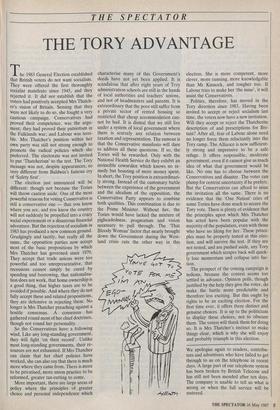THE SPECTATOR
THE TORY ADVANTAGE
The 1983 General Election established that British voters do not want socialism. They were offered the first thoroughly socialist manifesto since 1945, and they rejected it. It did not establish that the voters had positively accepted Mrs Thatch- er's vision of Britain. Sensing that they were not likely to do so, she fought a very cautious campaign. Conservatives had proved their competence, was the argu- ment; they had proved their patriotism in the Falklands war; and Labour was terri- ble. Mrs Thatcher's position within her own party was still not strong enough to promote the radical policies which she preferred. The electorate was not invited to put Thatcherism' to the test. The Tory message was not, despite appearances, so very different from Baldwin's famous cry of 'Safety first'.
The election just announced will be different: though not because the Tories will throw caution aside. One of the most powerful reasons for voting Conservative is still a conservative one — that you know where you are, and you know the country will not suddenly be propelled into a crazy social experiement or a disastrous financial adventure. But the rejection of socialism in 1983 has produced a new common ground. Grudgingly and tacitly,. but really all the same, the opposition parties now accept most of the basic propositions by which Mrs Thatcher has governed since 1979. They accept that trade unions were too powerful and too unrepresentative, that recessions cannot simply be cured by spending and borrowing, that nationalisa- tion does not work, that home ownership is a good thing, that higher taxes are to be avoided if possible. And where they do not fully accept these and related propositions, they are defensive in rejecting them. No longer is Mrs Thatcher preaching against a hostile consensus. A consensus has gathered round most of her chief doctrines, though not round her personality.
So the Conservatives have a following wind. Like any long-standing government, they will fight 'on their record'. Unlike most long-standing governments, their re- sources are not exhausted. If Mrs Thatcher can claim that her chief policies have worked, she can also say that there is much more where they came from. There is more to be privatised, more union practice to be reformed, greater tax-cutting to come.
More important, there are large areas of policy where the principles of greater choice and personal independence which characterise many of this Government's deeds have not yet been applied. It is scandalous that after eight years of Tory administration schools are still in the hands of local authorities and teachers' unions, and not of headmasters and parents. It is extraordinary that the poor still suffer from a private sector of rented housing so restricted that cheap accommodation can- not be had. It is dismal that we still live under a system of local government where there is scarcely any relation between taxation and representation. The rumour is that the Conservative manifesto will dare to address all these questions. If so, the Tories will be rewarded. Only with the National Health Service do they exhibit an invincible cowardice which knows no re- medy but boasting of more money spent. In short, the Tory position is extraordinari- ly strong. Instead of the customary battle between the experience of the government and the idealism of the opposition, the Conservative Party appears to combine both qualities. This combination is due to the Prime Minister. Without her, the Tories would have lacked the mixture of pigheadedness, pragmatism and vision necessary to pull through. The 'That Bloody Woman' factor that nearly brought down the Government during the West- land crisis cuts the other way in this election. She is more competent, more clever, more cunning, more knowledgable than Mr Kinnock, and tougher too. If Labour tries to make her 'the issue', it will assist the Conservatives.
Politics, therefore, has moved in the Tory direction since 1983. Having been invited to accept or reject socialism last time, the voters now have a new invitation. Will they accept or reject the Thatcherite description of and prescriptions for Bri- tain? After all, fear of Labour alone need no longer force them reluctantly into the Tory camp. The Alliance is now sufficient- ly strong and impressive to be a safe refuge. It offers responsible, moderate government, even if it cannot give us much idea of what that government would be like. No one has to choose between the Conservatives and disaster. The voter can plump for centrist uncertainty if he prefers. But the Conservatives can afford to issue the invitation all the same. There is no evidence that the 'One Nation' cries of some Tories have done much to secure the Tory vote. There is plenty of evidence that the principles upon which Mrs Thatcher has acted have been popular with the majority of the population, even with those who have no liking for her. These princi- ples must be properly tested at this elec- tion, and will survive the test. If they are not tested, and are pushed aside, any Tory government which scrapes back will quick- ly lose momentum and collapse into fac- tion.
The prospect of the coming campaign is tedious, because the contest seems too settled in advance. Opinion polls, though justified by the help they give the voter, do make the battle more predictable and therefore less exciting. But this ought by rights to be an exciting election. For the first time ever, it offers three distinct and genuine choices. It is up to the politicians to display these choices, not to obscure them. The voters will thank them for doing so. It is Mrs Thatcher's instinct to make things clear, which is why she will enjoy and probably triumph in this election.




















































 Previous page
Previous page